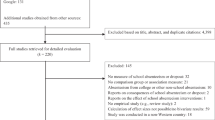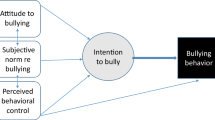Abstract
This cross-sectional survey on a sample of parent, teacher and child respondents (n = 195) elicited their perceptions on or about the ‘reasons/causes’ for academic problems in school students. A semi-structured ‘Demographic Data Sheet’ and another open ended exploratory ‘Causes of Academic Problems Interview Schedule’ (CAPIS) exclusively developed for this study was used. A classification of the ‘causes’ for academic problems into four categories by two independent observers revealed preponderance of ‘child-centered’ causes (N: 937), followed by ‘teacher-centered’ causes (N: 751), ‘parent-centered’ (N: 643) and ‘environment centered’ causes (N: 362). Analysis of trends show significant statistical differences in reported perceptions between the three respondents (p: < 0.04); with highest disparity between ‘teacher-centered’ causative perceptions (p: < 0.001). Concordance rates as measured by Cohen’s Kappa Coefficient is reflected by greater agreements on or about the reasons for academic problems between parent-teacher respondents (0.34) and least for child-teacher reports (−0.08). The results suggest an attitudinal triangulation on or about the reasons attributed for academic problems between parents, teachers and the children. This opens up the need for stepping up measures to de-triangulate or harmonize these varying inter personal perceptions for optimum benefit of such children.

Similar content being viewed by others
References
Aeurbach, E. R. (1989). Toward a social contextual approach to family literacy. Harvard Educational Review, 59(2), 165–181.
Alexander, K., Entwisle, D., & Dauber, S. (1994). On the success of failure: A reassessment on the effects of retention in the primary grades. Cambridge, MA: Cambridge University Press.
Altermatt, E. R., Pomerantz, E. M., Ruble, D. N., Frey, K. S., & Greulich, F. K. (2002). Predicting changes in children’s self-perceptions of academic competence: A naturalistic examination of evaluative discourse among classmates. Developmental Psychology, 38(1), 903–917.
Altrichter, H., Posch, P., & Somekh, B. (2006). Teachers investigate their work: An introduction to the methods of action research. London: Routledge.
Anthony, G. (2000). Factors influencing first year students success in mathematics. International Journal of Mathematics Education in Science and Technology, 31(1), 3–15.
Aysan, F., Tanriogen, G., & Tanriogen, A. (1996). Perceived causes of academic failure among the students at the faculty of education at Buca: Technical research report. Izmir, Turkey: Dokuz Eylul University.
Borich, G. D., & Tombari, M. L. (1997). Education psychology: A contemporary approach (2nd ed.). New York: Longman.
Brookover, W., Beady, C., Flood, P., Schweietzer, J., & Wisenbaker, J. (1979). School social systems and student achievement. New York: Praeger.
Brosco, J. P., Perez, T., Guerra, V., Spar, D., & Levy-Jaffe, J. (2004). Screening for academic problems in school age children. Journal of Developmental and Behavioral Pediatrics, 25(5), 372.
Cohen, J. (1960). A coefficient of agreement for nominal scales. Educational and Psychological Measurements, 20(1), 37–46.
Cohen, L., & Manion, L. (2000). Research methods in education (5th ed., p. 254). Routledge: New York.
Desimone, L. (1999). Linking parental involvement with student achievement: Do race and income matter. Journal of Educational Research, 94(1), 11–30.
Dworking, P. H. (1989). School failure. Pediatric Review, 10(1), 301–312.
Easten, L. (2002). Lessons from Learners. Educational Leadership, 60(7), 64–68.
Finlayson, D. S. (1971). Parental Aspiration and the Educational Achievement of Children. Journal of Education Research, 14(1), 61–64.
Fonseca, J. M., & Conboy, J. E. (2006). Secondary Student perceptions of factors effecting failure in science in Portugal. Eurasia Journal of Mathematics, Science and Technology Education, 2(2), 82–95.
Forsyth, D. R., Story, P. A., Kelley, K. N., & McMillan, J. H. (2009). What causes failure and success? Students’ perceptions of their academic outcomes. Social Psychology of Education, 12(2), 157–174.
Frome, P. M., & Eccles, J. S. (1998). Parents’ influence on children’s achievement-related perceptions. Journal of Personality and Social Psychology, 74(2), 435–452.
Gentry, M., & Springer, S. (2002). Secondary student perceptions of their class activities regarding meaningfulness, challenge, choice and appeal: An initial validation study. Journal of Secondary Gifted Education, 13(1), 192–204.
George, D., & Mallery, P. (2003). SPSS for windows step by step: A simple guide and reference. 11.0 Update (4th ed.). Boston: Allyn and Bacon.
Harvey, J. H., & Weary, G. (1985). Attribution: Basic issues and applications. San Diego: Academic.
Heider, F. (1958). The psychology of interpersonal relations. New York: John Wiley.
Kerig, P. K. (1995). Triangles in the family circle: Effects of family structure on marriage, parenting, and child adjustment. Journal of Family Psychology, 9(1), 28–43.
Nie, N., Hull, C. H., Jenkins, J. G., Steibrenner, K., & Bent, D. H. (1975). Statistical package for the social sciences (2nd ed.). New York: McGraw Hill.
O’ Donoghue, T., & Punch, K. (2003). Qualitative educational research in action: Doing and reflecting (p. 78). Routledge: New York.
Perry, P. P., Hechter, F. J., Menec, V. H., & Weinberg, L. H. (1993). Enhancing achievement motivation and performance in college students: An attribution retraining perspective. Research in Higher Education, 34(6), 687–723.
Rayneri, L., & Gerber, B. (2004). Development of a student perceptions inventory. Roeper Review, 26(2), 90–95.
Repetti, R. L. (1996). The effects of perceived daily social and academic failure experiences on school-age children’s subsequent interactions with parents. Child Development, 67(1), 1467–1482.
Shah, H. (2007). Psychosocial aspects of academic failure in children. Health Administrator, 17(1), 34–37.
Shenoy, J., Kapur, M., & Kaliaperumal, V. G. (1998). Psychological disturbances among 5–8 year old children: A study from India. Social Psychiatry and Epidemiology, 33(1), 66–73.
Siegal, S., & Castellan, N. J., Jr. (1988). Non-parametric statistics for the behavioral sciences (2nd ed., pp. 235–244). New York: McGraw Hill.
Teale, W. H. (1986). Home background and young children’s literacy development. In W. H. Teale & E. Edwad (Eds.), Emergent literacy: Writing and reading (pp. 33–39). Norwood, New Jersey: Ablex Publishing Corporation.
Tollefson, N., Hsia, S., & Townsend, J. (2006). Teachers’ perceptions of students’ excuses for academic difficulties. Psychology in the Schools, 28(2), 146–155.
Venkatesan, S. (2004). Children with developmental disabilities: A training guide for parents, Teachers and caregivers. New Delhi: Sage (India) Publications.
Venkatesan, S. (2010). Academic problems in primary school children enrolled under SSA-Karnataka: Study manual for master trainers. Mysore: All India Institute of Speech and Hearing.
Venkatesan, S., & Purusotham, P. (2006). Historical analysis on course and clinical presentations of children with learning disabilities in India. Disabilities and Impairments, 21(2), 99–107.
Weiner, B. (1974). Achievement motivation and attribution theory. Morristown, New Jersey: General Learning Press.
Weiner, B. (1986). An attribution theory of motivation and emotion. New York: Springer.
Wong, E., Wiest, D., & Cusick, L. (2002). Perceptions of autonomy support, parent involvement, competence and self worth as predictors of motivational orientation and academic achievement: An examination of sixth and ninth grade regular education students. Adolescence, 37(146), 225–266.
Author information
Authors and Affiliations
Corresponding author
Rights and permissions
About this article
Cite this article
Venkatesan, S. Blame Game Triangulation between Parents, Teachers and Children with Academic Problems. Psychol Stud 56, 206–215 (2011). https://doi.org/10.1007/s12646-011-0082-1
Received:
Accepted:
Published:
Issue Date:
DOI: https://doi.org/10.1007/s12646-011-0082-1




